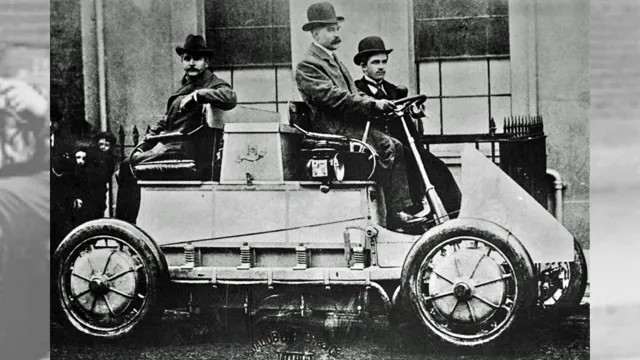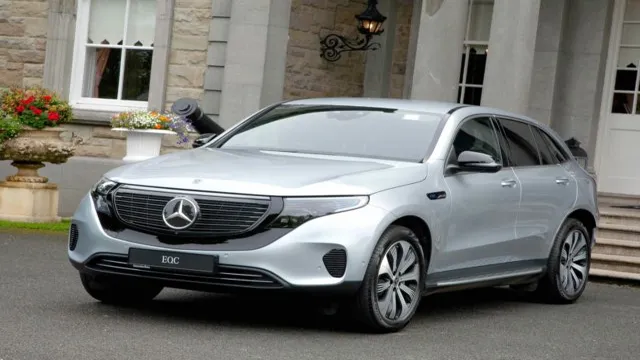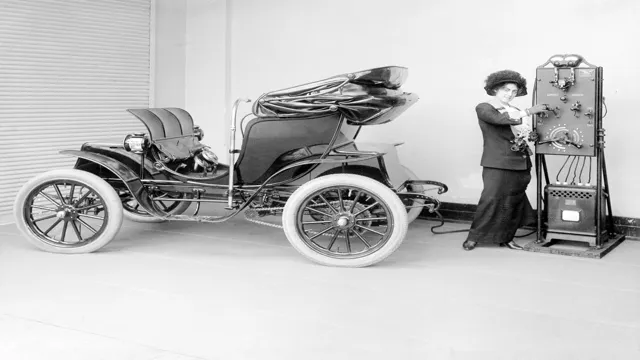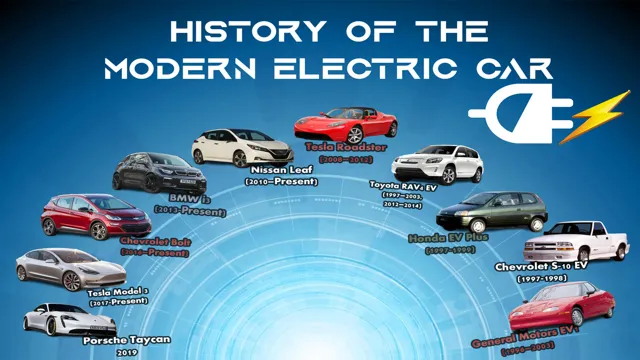The Revolutionary Evolution: Tracing the History of the Electric Car
Electric cars have become a familiar sight on our roads today, but did you know that their history stretches back over 100 years? It’s a fascinating story that has seen the electric car go from a niche vehicle to a mainstream option once again. But what led to this electrifying resurgence, and what were the key developments that made it possible? In this blog post, we’ll dive deep into the history of electric cars and explore the challenges and breakthroughs that have shaped their evolution over time. From early innovations to the latest cutting-edge technology, we’ll take a fascinating journey through the highs and lows of this revolutionary form of transportation.
So buckle up and join us as we explore the electrifying history of electric cars.
Early Beginnings
The history of electric cars dates back to the late 1800s when inventors such as Thomas Davenport and Robert Anderson created the first crude electric cars. However, it was not until the 1900s that electric cars were mass-produced. In the early 1900s, electric cars were more popular than gasoline cars because they were cleaner, highly efficient, and more comfortable to drive.
They were also considered the car of choice for women because they were easy to start, odorless, and quiet. However, the high cost of batteries, limited range, and lack of power slowed down the production and use of electric cars. By the mid-1900s, gasoline cars had become more popular due to the abundance of oil and the increased availability of gasoline.
However, the last decade has seen a renewed interest in electric cars, driven by advances in technology, concerns about the environment, and the rising cost of gasoline. Electric cars have now become more affordable, dependable, and efficient, with longer ranges and quicker charging times than their early predecessors. They are also environmentally friendly, producing fewer emissions, promoting energy independence, and helping to combat climate change.
The First Electric Vehicle
The early beginnings of electric vehicles date back to the 19th century, with the first practical electric car being invented by Thomas Davenport in 183 His invention was a small-scale electric vehicle that had a primitive motor running on a battery. While Davenport’s invention wasn’t successful commercially, it sparked interest in developing electric vehicles.
However, it wasn’t until the late 1800s when electric cars became more common on the roads. In 1897, the Electric Vehicle Company became the first automobile company in the United States that produced electric cars for a mass market. Their first model had a top speed of 20 mph and could travel up to 50 miles on a single charge.
Despite the promising development, the rise of gasoline-powered automobiles quickly overshadowed the electric vehicles’ achievements. Still, the early beginnings of electric vehicles paved the way for sustainable transportation, and the technology has continued to evolve over time towards the electric cars we know today.
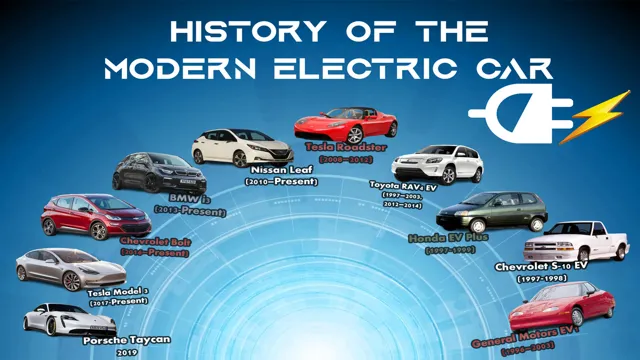
Competition with Gasoline Cars
When it comes to competing with gasoline cars, the early beginnings of electric cars can be traced back to the 1800s. In fact, the first electric car that was capable of traveling at a speed of 14 miles per hour was developed by Thomas Davenport in 183 However, it wasn’t until the late 19th and early 20th centuries that electric cars began to gain popularity and compete with gasoline-powered vehicles.
During this time, electric cars were commonly used in cities due to their quiet operation, lack of exhaust emissions, and ability to operate in small spaces. Despite this, electric cars struggled to compete with gasoline cars, which were more powerful and had longer range capabilities. It wasn’t until the 21st century, when technological advancements made electric cars more efficient and affordable, that they began to seriously challenge gasoline cars on the market.
Today, electric cars continue to improve and are becoming more widely adopted as an eco-friendly alternative to gasoline cars.
Resurgence in the 21st Century
The history of the electric car dates back to the late 1800s, when inventors were experimenting with early versions of electric vehicles. However, it wasn’t until the turn of the 21st century that electric cars experienced a resurgence thanks to advancements in technology and growing concerns about the environment. Today, many major car manufacturers offer electric models, and the market for electric cars continues to grow.
From the sleek and stylish Tesla Model S to the affordable and practical Nissan Leaf, there is a wide variety of electric cars available for consumers to choose from. While range anxiety and charging infrastructure still pose challenges for some, the benefits of electric cars, including reduced emissions and lower fuel costs, make them an attractive option for many drivers. As more and more drivers make the switch to electric, it’s clear that the electric car is here to stay.
Advancements in Battery Technology
These days, it seems like everyone is talking about advancements in battery technology. And with good reason! Batteries are becoming more powerful and efficient every year, and they’re quickly becoming one of the most important technological innovations of our time. From electric cars to smartphones to renewable energy storage, batteries play a vital role in our daily lives.
One of the biggest areas of growth in battery technology is in the realm of renewable energy storage. As solar and wind power become more and more prevalent, we need better ways to store and distribute that energy. That’s where batteries come in.
With the latest advancements in battery tech, we can now store renewable energy more efficiently and effectively than ever before. It’s an exciting time to be following the world of batteries!
Government Incentives and Regulations
There has been a resurgence in the 21st century when it comes to government incentives and regulations. This is great news for both businesses and consumers. Governments have recognized the need to provide incentives for businesses that are environmentally conscious and are making an effort to reduce their carbon footprint.
These incentives come in the form of reduced taxes, rebates, and subsidies for using cleaner energy. Additionally, regulations are being put in place to ensure that businesses are accountable for their actions and are actively working towards preserving the environment. This is not only good for the environment but also good for businesses as it helps to build a positive brand image and increase customer loyalty.
With increased government incentives, businesses have been motivated to invest in clean technology and sustainable business practices, which is a win for everyone. So, the next time you think about making a purchase, check if the business is actively working towards preserving the environment. By doing so, you will be supporting a business that is doing their part to create a cleaner and more sustainable future.
Major Players in the Electric Car Market
Electric Car Market The electric car market has been experiencing a resurgence in the 21st century. Major players such as Tesla, Nissan, and Chevrolet are leading the way in producing high-quality electric cars that are becoming increasingly popular with consumers. Tesla’s Model S, Model X, and Model 3 are some of the most well-known electric vehicles on the market.
Nissan’s LEAF and Chevrolet’s Bolt are also popular choices. In addition to these major players, there are also a number of smaller companies that are starting to gain traction in the electric car market. As more and more consumers become interested in reducing their environmental impact and saving money on fuel costs, the electric car market is likely to continue to grow in the coming years.
With advancements in battery technology and the increasing availability of charging stations, electric cars are becoming a more viable option for a wider range of people.
Future of Electric Cars
When it comes to the history of electric cars, many people believe that it’s a recent development. However, the reality is quite different. Electric cars have been around for more than a century, with the first electric car introduced in the late 19th century.
At the turn of the 20th century, electric cars were quite popular, especially for city driving. They were quieter, easier to drive, and required less maintenance than gas-powered vehicles. However, the invention of the assembly line by Henry Ford made gas-powered vehicles more affordable, and electric cars gradually lost their popularity.
It wasn’t until the oil crisis in the 1970s that electric cars made a brief comeback. Today, electric cars are once again growing in popularity, thanks in part to advances in technology and the need to reduce our carbon footprint. With more manufacturers developing electric cars and expanding charging infrastructure, the future of the electric car looks bright.
Predicted Market Growth
The future of electric cars is looking bright, with a predicted market growth that is set to skyrocket over the next few years. As we become more aware of the impact of our actions on the environment, more and more people are turning to electric cars to reduce their environmental impact. The sales of electric cars have been increasing steadily over the last few years, and this trend is set to continue in the future.
In fact, experts predict that the global market for electric cars will grow by a staggering 28% over the next five years! This is driven by a number of factors, including government initiatives to reduce carbon emissions, ever-improving battery technology, and the fact that electric cars are becoming more affordable and accessible to the average consumer. The potential for electric cars is enormous, and there is no doubt that they will play a key role in the future of transport. In the years to come, we can expect to see more and more electric cars on the road as people become increasingly aware of the benefits of eco-friendly driving.
Not only do electric cars help to reduce our carbon footprint, but they also offer a number of other benefits, such as reduced fuel costs and reduced maintenance costs. As the technology continues to improve and become more efficient, we can expect to see even more benefits from electric cars, such as increased range and faster charging times. In conclusion, the predicted market growth for electric cars is a sure sign that they are the future of the automotive industry.
As drivers become more environmentally conscious and seek out more sustainable options, electric cars will undoubtedly become the norm. With their many benefits, it’s easy to see why electric cars are gaining popularity at such a rapid pace. And as the technology continues to improve, we can expect even more developments in this exciting and rapidly evolving industry.
So, whether you’re already driving an electric car or considering making the switch, you can rest assured that you’re investing in the future of the planet and the future of the automobile.
Environmental Impact and Sustainability
The future of electric cars looks bright, especially when it comes to their potential impact on the environment. Electric cars produce zero emissions, making them a much greener option compared to traditional gasoline-powered cars. With the increasing focus on sustainability and reducing global carbon emissions, electric cars are becoming more popular among both everyday drivers and businesses alike.
As more charging stations are installed and battery technology continues to advance, the range and reliability of electric cars will only improve, making them a practical option for more people. The potential savings in fuel costs for electric car owners could also be significant over time, as electricity is generally cheaper than gasoline. As the push for environmentally-friendly transportation continues to grow, electric cars are poised to play a major role in reducing our carbon footprint and creating a more sustainable future.
Conclusion
As the history of the electric car shows, innovation and progress are often met with resistance and skepticism. However, with advancements in technology and increasing awareness of the need for sustainable transportation, electric cars are now becoming more widely accepted and embraced. Just like the electric car, sometimes it takes a little extra effort to overcome initial doubts and push forward towards a brighter, cleaner future.
So, let’s keep charging ahead and driving towards a world that runs on renewable energy!”
FAQs
What is the history of electric cars?
The history of electric cars goes back to the mid-19th century, when inventors started experimenting with electricity-powered vehicles. However, the modern electric car was not produced until the 1990s.
What are the benefits of owning an electric car?
Owning an electric car has several benefits, including lower emissions, lower fuel costs, and fewer maintenance requirements. Additionally, many countries offer incentives for purchasing electric cars.
How do electric cars work?
Electric cars use a battery pack to power an electric motor that moves the wheels. The battery is charged by plugging it into an electric source, such as a charging station or an outlet.
What is the range of an electric car?
The range of an electric car depends on the battery capacity and the driving conditions. Most electric cars can travel between 100-300 miles on a single charge. However, this varies depending on the model and driving habits.
How much does it cost to charge an electric car?
The cost to charge an electric car depends on the cost of electricity in your area and the size of your car’s battery. On average, it costs between $5 to $15 to fully charge an electric car, making it much cheaper than traditional gasoline-powered vehicles.
